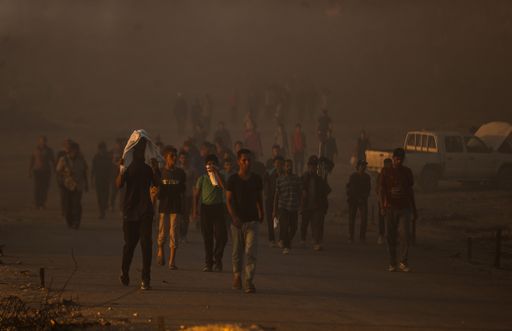Israeli Prime Minister Benjamin Netanyahu's meeting with US President Donald Trump in Washington on Monday carries high stakes — not only for the prospects of a ceasefire in Gaza, but also for Netanyahu's increasingly fragile grip on power.
After more than 21 months of genocide in Gaza, Netanyahu is under intensifying international scrutiny, including an arrest warrant from the International Criminal Court (ICC) for "war crimes" in the besieged Palestinian enclave.
Israel has been carrying out a genocide in Gaza since October 2023. Palestinians have recorded killings of more than 57,500 Palestinians, most of them women and children.
Some 11,000 Palestinians feared buried under rubble of annihilated homes, according to Palestine's official WAFA news agency.
Experts, however, contend that the actual death toll significantly exceeds what the Gaza authorities have reported, estimating it could be around 200,000.
At home, Netanyahu faces a volatile political landscape: mounting criticism over military failures, a stalled hostage crisis, corruption allegations, elections less than a year away, and a coalition dominated by far-right figures who threaten to collapse the regime if he agrees to a permanent ceasefire.
Israeli analyst and former negotiator Gershon Baskin told Anadolu Agency the Washington visit is part of a broader campaign to rehabilitate his image, and "redeem himself after the failures of October 7."
Apart from Gaza, the meeting is also expected to focus on regional issues such as Iran's nuclear programme, developments with Lebanon and Hezbollah, and expansion of the Abraham Accords.

Could there be a definitive ceasefire?
The top priority of the meeting is expected to be a ceasefire deal between Israel and Hamas.
Reports suggest Israel has accepted the current proposal, under which Hamas would release about half of the captives over a 60-day period. Hamas has submitted a positive response, and on Saturday, Israel announced plans to send mediators to Qatar for indirect talks.
But analysts such as Ryan Bohl, senior Middle East and North Africa analyst at intelligence firm RANE Network, say Israel is unlikely to agree to a long-term truce.
"From Netanyahu's perspective, a temporary ceasefire is acceptable because it could get out some hostages … It would allow Israel's soldiers to get some rest from intensive combat. It would take some political pressure off of Netanyahu," he told Anadolu Agency.
He said the Israeli regime is likely to demand the right to resume offensives after 60 or 120 days. Unless Hamas goes into exile or surrenders, Israel will continue to try to erode the resistance group's capabilities.
"From Hamas' perspective, on the other hand, it's about buying time until the next Israeli elections," Bohl added, referring to the legislative elections scheduled to be held by October 27, 2026.
Trump, meanwhile, could benefit politically by framing a ceasefire as proof of his ability to "end wars."
"He wants to sell the narrative that he is ending conflicts," Bohl said. He believes the US could use military aid as leverage to force a breakthrough.
Baskin believes that whatever is to happen depends on the US president, as "Netanyahu cannot say no to Trump."
"Israel is dependent on the US," he said. "If Trump is decisive and wants Netanyahu to end the war, the war will end."
Baskin also noted that during a previous failed ceasefire attempt in March, Hamas claimed it had received assurances from the US that Israel would fully withdraw from Gaza.
"If that's true, what it means is that the 60-day ceasefire could become permanent," he said.
"Trump thinks that Netanyahu owes him," Eytan Gilboa, an expert on US-Israel affairs at Bar-Ilan University near Tel Aviv, told AP news agency.
"And if Trump thinks that he needs to end the war In Gaza, then that is what he will need to do."

West Bank annexation and two-state solution
Ahead of the meeting, 14 ministers from Netanyahu's Likud party called for the immediate annexation of the occupied West Bank.
When asked about US backing, State Department spokesperson Tammy Bruce said last week the US "stands with Israel and its decisions and how it views its own internal security."
Bohl said annexation remains unlikely but noted that some on the Israeli far right may see it as an opportunity.
"Israel's far right buys the idea that 'we'll call it a permanent ceasefire while we annex the West Bank, absorb whatever backlash we're going to get from that, and then two years down the line, we'll resume the war in Gaza,'" he said.
Baskin believes Trump may push Netanyahu to discuss his longer-term vision for Gaza and Palestine.
"I think that Trump will talk about the day after in Gaza, which has to include a wider political formula for moving the two-state solution forward or for addressing the Palestinian issue," he said.
During Trump's recent tour of the Middle East – where he did not visit Israel – Baskin noted that he discussed the question of Palestine and a two-state solution with leaders of Gulf countries.

Expansion of so-called Abraham Accords
Trump is also expected to push for expanding the so-called Abraham Accords, a series of agreements that normalised ties between Israel and Arab states.
"It is possible that Netanyahu tries to show that he's more constructive on the Abraham Accords by, for example, announcing a partial retrenchment of Israeli forces from southern Syria," said Bohl.
While he does not expect a full-scale normalisation announcement with Syria, Bohl said something "concrete" could emerge from the meeting.
He said the ultimate prize for both Trump and Netanyahu remains Saudi Arabia, whose officials have made it clear that normalisation depends on an end to the Gaza war and progress towards Palestinian statehood.
Given Riyadh's stance, Bohl said the US and Israeli leaders could push for some other sort of deal that would be less significant than complete normalisation.
Analysts also expect Iran and Lebanon to feature in Monday's discussions.
The US and Israel will discuss "next steps on Iran's nuclear programme and assess what they need to do in that regard," said Bohl, adding that the talks will also likely cover the issue of "Hezbollah’s disarmament."
Netanyahu's legal woes and Trump's support
The meeting also comes as Trump continues to voice support for Netanyahu amid his ongoing corruption trial, calling the proceedings a "witch hunt" and attacking Israeli prosecutors.
The trial was recently delayed for classified security reasons, prompting speculation about US influence. But Bohl said any legal decisions remain in the hands of Israeli authorities.
Baskin offered similar insight.
"The trial has begun. It’s very difficult to end a trial in the middle unless there’s some kind of agreement for a deal, or if Netanyahu accepts responsibility and guilt," he explained.
"He can ask the president to give him amnesty to relieve him of the charges, but this is an internal Israeli process, so Trump really cannot intervene in that process."

Netanyahu’s political survival on the line
Analysts say even if Netanyahu secures a ceasefire and hostage release, his political survival is far from assured.
"I think most Israelis have their minds made up about Netanyahu ... If the elections were held today, Netanyahu is finished," said Bohl.
He noted that many blame Netanyahu for the October 7 failures and accuse him of politicising the war.
"I think it’s very hard for him to come back from that, even if he successfully gets the hostages out," he added.
At the same time, Netanyahu runs the risk of his far-right partners breaking the coalition if there is a ceasefire, Bohl added.
If his far-right partners leave the government, Netanyahu could be forced to seek support from rivals like Benny Gantz.
"I think that would put a timer on the collapse of the Netanyahu government," he said. "Because as soon as the hostages are out, I think Gantz would collapse the government and force elections to get rid of Netanyahu."



















